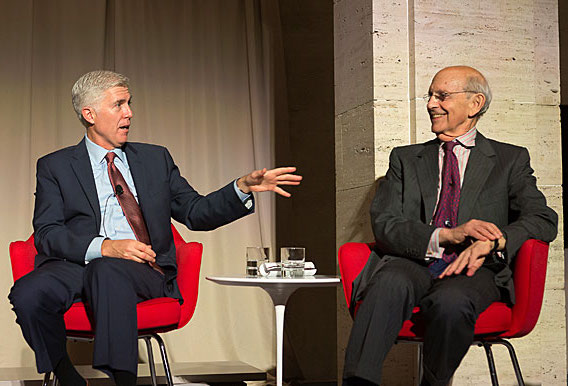New Bill Would Bring Greater Transparency to Judges’ and Justices’ Lavish Trips
Third branch would be required to provide more information about their reimbursed travel, lodging and food, akin to what members of Congress and Executive Branch officials submit
Fix the Court is applauding today’s introduction of a bicameral, bipartisan bill that would require federal judges, including Supreme Court justices, to reveal more information about their often luxurious travel and gifts – and to do so online and in a more timely fashion.
The Judicial Travel Accountability Act (S. 2632 / H.R. 4715), introduced today by Sheldon Whitehouse (lead), Richard Blumenthal, Cory Booker, Sherrod Brown, Dick Durbin, Amy Klobuchar, Patrick Leahy, Ed Markey and Ron Wyden in the Senate and David Cicilline (lead), Ben Cline, Eleanor Holmes-Norton and Sheila Jackson-Lee, and in the House, would compel members of the judiciary to submit an online report comprising their and their spouse’s reimbursed transportation, lodging and meal expenses within 15 days of a trip’s conclusion and would require an exact dollar amount for each reimbursement. The bill also removes a loophole that allows judges to avoid disclosing food, lodging, entertainment and gifts if they are considered “personal hospitality.”

Currently, judges and justices are only obligated to divulge travel and gift information once per year, in their annual disclosure reports, which the U.S. Courts do not post online. Judicial officers are not required to list dollar amounts, just whether each reimbursed excursion or each gift topped a statutory threshold, which today is $390.
“Judges and justices receive free trips around the world, and the American people deserve to know in a timely manner how much the excursions cost and who’s paying,” FTC’s Gabe Roth said. “Officials in the executive and legislative branches are already compelled to disclose this type of information, so there’s no reason judicial travel and gift reporting should remain exempt from accepted standards.”
“I appreciate the efforts of Sen. Whitehouse, Rep. Cicilline and their colleagues to bring greater oversight to the most powerful, least accountable part of our government,” Roth added.
Each year, members of the federal judiciary collectively take thousands of trips, often to exotic locales and resorts, with partisan interest groups, well-connected political donors or federal court litigants often footing the bill.
Sometimes it’s the sheer number of trips that raise ethical flags, like the 20 Justice Stephen Breyer took in 2016 or the 24 former Ninth Circuit Judge Alex Kozinski took that year. It can also be the source of the reimbursement, as two Breyer trips were funded by a foundation started by the Pritzker family, which often supports political work on the left, and one Kozinski trip was paid for by The Fund for American Studies, which supports legal work on the right.
Other times, it’s the destinations that are disquieting, as Judge David Carter of the Central District of California was reimbursed in a single year for travel to Afghanistan, the Czech Republic, Indonesia, Kazakhstan, Malaysia, Malta, Sri Lanka and Turkey. The substance of a trip may also be of public interest, such as when Judge Rodney Gilstrap, from the very district famous for its patent-centric docket (E.D. Tex.), received an expenses-paid, nine-day-long trip to South Korea to talk patents.
The last financial disclosure report submitted by Justice Antonin Scalia, for 2014 (note the erroneous submission date in the upper right), included 23 reimbursed trips, including to Hawaii, Ireland and Switzerland. Scalia also received a free trip in 2016 from businessman John Poindexter to the Marfa, Tex., ranch on which he passed away, whose rooms cost upwards of $700 per night. A Poindexter company, Mic Group, had been a high court litigant four months before the trip took place (Hinga v. Mic Group, cert. denied, Oct. 5, 2015), though there were no reporting requirements for the trip since Scalia died before his next annual filing was due.
Several federal judges are already accustomed to listing reimbursement amounts or posting gift details online, as their previous jobs required that level of detail. When Fifth Circuit Judge Don Willett, for example, sat on the Supreme Court of Texas, he recorded the reimbursement figures for his food, travel and lodging for his periodic speaking engagements to the penny. And when Eleventh Circuit Judge Britt Grant served on the Supreme Court of Georgia, her extra-judicial compensation and reportable gifts were searchable online for members of the public.